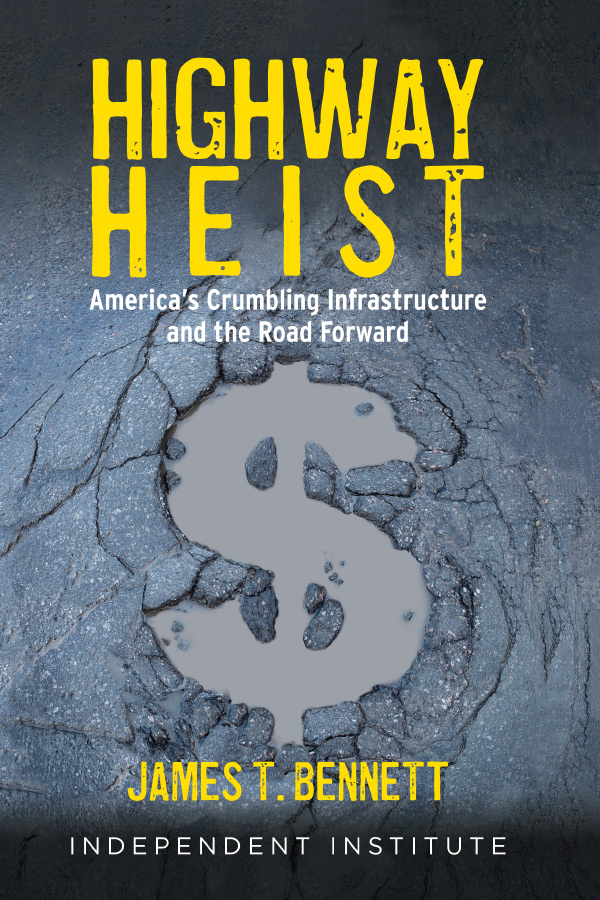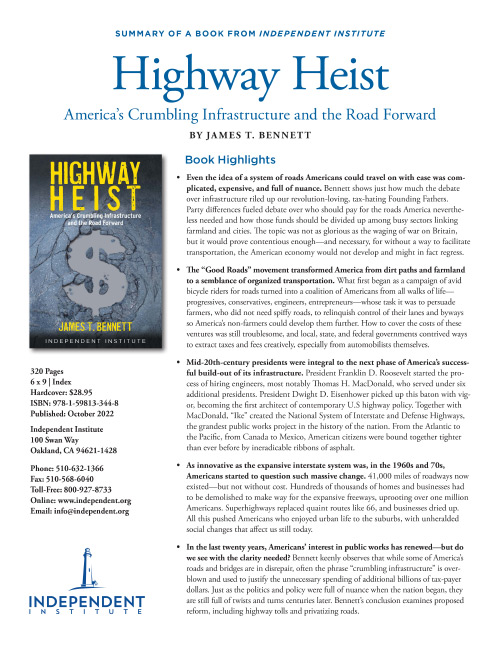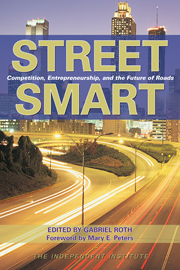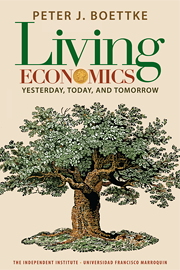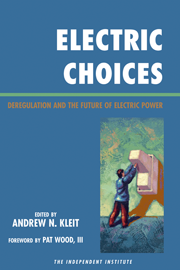| Price: | $26.95 |
| Price: | $26.95 |
Overview
Professor James Bennett guides readers through centuries of one of the most underrated yet widely used aspects of American life: roads. Relying on history and economic data, and with a humorous and oftentimes sharp tongue, Bennett explains how important America’s highways and byways have been to everything from policymaking to everyday life. Crafting them took persuasion, planning, and more taxes than any politician could have dreamed of. And far too often their realization—thanks, in Bennett’s view, to flawed interpretations of the power of eminent domain—required destruction, sometimes on a massive scale, of long-established neighborhoods and important cityscapes. Likewise, the upkeep of America’s highways has been the center of many a policy battle, waged by Republicans and Democrats alike. We all want roads in good working condition, but just how and who will pay for them remain contentious questions. Bennett argues persuasively that the road forward just might be a second, but more serious, sustained look at, and local experimentation with, private roads and toll roads. Agree or disagree with him, Bennett has written a significant contribution to America’s ongoing debate about how her citizens should traverse, from “sea to shining sea,” its fruited plain.
Contents
Acknowledgments
Introduction
- Internal—or Infernal?—Improvements: A New Nation Confronts Infrastructure
- Good Roads—or Here Come the Wheelmen!
- Ike’s Autobahn: The National System of Interstate and Defense Highways
- We’re Not Going to Take It Anymore: Americans Revolt against the Freeway
- Crumbling Infrastructure or Focus-Group Buzzwords?
Conclusion
Notes
Index
About the Author
Detailed Summary
- Even the idea of a system of roads Americans could travel on with ease was complicated, expensive, and full of nuance. Bennett shows just how much the debate over infrastructure riled up our revolution-loving, tax-hating Founding Fathers. Party differences fueled debate over who should pay for the roads America nevertheless needed and how those funds should be divided up among busy sectors linking farmland and cities. The topic was not as glorious as the waging of war on Britain, but it would prove contentious enough—and necessary, for without a way to facilitate transportation, the American economy would not develop and might in fact regress.
- The “Good Roads” movement transformed America from dirt paths and farmland to a semblance of organized transportation. What first began as a campaign of avid bicycle riders for roads turned into a coalition of Americans from all walks of life—progressives, conservatives, engineers, entrepreneurs—whose task it was to persuade farmers, who did not need spiffy roads, to relinquish control of their lanes and byways so America’s non-farmers could develop them further. How to cover the costs of these ventures was still troublesome, and local, state, and federal governments contrived ways to extract taxes and fees creatively, especially from automobilists themselves.
- Mid-20th-century presidents were integral to the next phase of America’s successful build-out of its infrastructure. President Franklin D. Roosevelt started the process of hiring engineers, most notably Thomas H. MacDonald, who served under six additional presidents. President Dwight D. Eisenhower picked up this baton with vigor, becoming the first architect of contemporary U.S highway policy. Together with MacDonald, “Ike” created the National System of Interstate and Defense Highways, the grandest public works project in the history of the nation. From the Atlantic to the Pacific, from Canada to Mexico, American citizens were bound together tighter than ever before by ineradicable ribbons of asphalt.
- As innovative as the expansive interstate system was, in the 1960s and 70s, Americans started to question such massive change. 41,000 miles of roadways now existed—but not without cost. Hundreds of thousands of homes and businesses had to be demolished to make way for the expansive freeways, uprooting over one million Americans. Superhighways replaced quaint routes like 66, and businesses dried up. All this pushed Americans who enjoyed urban life to the suburbs, with unheralded social changes that affect us still today.
- In the last twenty years, Americans’ interest in public works has renewed—but do we see with the clarity needed? Bennett keenly observes that while some of America’s roads and bridges are in disrepair, often the phrase “crumbling infrastructure” is overblown and used to justify the unnecessary spending of additional billions of tax-payer dollars. Just as the politics and policy were full of nuance when the nation began, they are still full of twists and turns centuries later. Bennett’s conclusion examines proposed reform, including highway tolls and privatizing roads.
Infrastructure is a hot topic for all political parties. The right thinks the government is inefficient in its building of roads, producing, as a result, a crumbling mess of highways and byways. The left has expanded the term “infrastructure” to apply to things the Founders likely didn’t want it to entail. These differing views raise questions. What is infrastructure? If it’s so vital, why are America’s roads a mess? Or are they? Written by one of America’s foremost experts on the topic, James Bennett, Highway Heist answers these questions and more. Research Fellow at the Independent Institute, Dr. Bennett holds the William P. Snavely Chair of Political Economy and Public Policy in the Department of Economics at George Mason University. With an historian’s eye for detail, and an economist’s calculator for supply and demand, Bennett lays out what America’s infrastructure has looked like from the time when mere horse-drawn carriages and canals connected Americans to what we see now: an expansive, intricate lacework of highways crisscrossing America. While the Founding Fathers could see infrastructure’s importance, they could not decide how to establish it—and most importantly, who should pay for it. The “internal improvement” issue caused controversy among them and was the catalyst for many a robust argument. Both yesterday and today. Millions of Americans travel billions of miles per year on every surface—from California’s state route 1 to Washington D.C.’s “Capital Beltway.” In this book, Bennett explains how America’s infrastructure has gone from an idea, to superhighways, to a crumbling mess, and, perhaps, to not as bad as we think. Bennett also suggests nongovernmental solutions to the infrastructure problems in America that in fact could use improvement.
Are Roadways Even in the Constitution?
Bennett begins by exploring the most contentious, and consequential, transportation issues of the early nineteenth century. Politicians mention infrastructure so often now, it’s hard to imagine a time when it didn’t even exist. Bennett paints a vivid picture of that time—and demonstrates that, but for a few influential persons, government provision of roads would never have come to pass. Thomas Jefferson, states’ rights champion, paradoxically supported a major expansion of government’s role in facilitating the movement of goods and people. So did President John Quincy Adams, who advocated for the construction of large public works with the assistance of the federal government. Andrew Jackson strongly disagreed, but his side lost the public debate. And so was set the stage for the most sophisticated, massive, interconnected highway system ever in history. But controversy accompanied this growth, and, although the dollar signs and specifics have changed with the times, the echoes of those debates can be heard today on the floors of Congress.
America’s “Good Roads” Movement Begins
Once America’s leaders had decided roads, though of questionable constitutionality, were vital to the economy, hurdles nevertheless remained—like who should pay for them and who should build them. Chapter two reviews the “Good Roads” movement, which starts as “the project of bicycle enthusiasts around the upper-crust League of American Wheelmen” but quickly enough expands—just as government programs, as Bennett cogently reminds us, always expand—to include a coalition of progressives, engineers, and business leaders whose primary obstacle was the persuading of truculent farmers to cede local control of road maintenance and to more remote centers of power, up to and including the new state departments of transportation. This chapter also surveys early efforts by the states and the federal government to extract taxes and fees from automobilists, as well as the formative experiences of such later architects of U.S. highway policy as Dwight D. Eisenhower and Thomas H. MacDonald of the Bureau of Public Roads. A central theme throughout? Centralization. Lots of it.
Highways, Byways, Freeways, and Roadways
In chapter three, Bennett outlines the genesis, development, and eventual enactment of the National System of Interstate and Defense Highways, something he calls the “grandest public works project in the history of the nation, if not the world.” In April 1941, President Roosevelt appointed a seven-man Interregional Highway Committee to plan a postwar national road network. The committee recommended the creation of a national web of interregional highways that would total thirty-nine thousand miles. Though the Second World War halted most highway construction, slowly but surely incredible thoroughfares were built: the 160-mile
Pennsylvania Turnpike, for example, and the 570-mile New York State Thruway, a toll road. Later, experts would dub the Interstate Highway System (IHS), spearheaded by President Dwight D. Eisenhower, more significant than Egypt’s pyramids, the Panama Canal and China’s Great Wall. A public policy initiative with greater influence on modern America can hardly be named.
Not surprisingly, the building of a complex, intertwined interstate infrastructure proved immensely expensive. Streets and highways accounted, for instance, for one-third of the Public Works Administration (PWA) projects, costing a cool $1.3 billion. And once built, the massive system of roads required—and requires still—an immense amount of care, which meant, and still means, an outlay of even more funds. In addition to budget-conscious conservatives, social critics, from the left and the right, also prophetically cautioned against the massive destruction and displacement that construction of the interstate would likely entail.
Problems Begin; Solutions Emerge
In chapter four, Bennett pulls back the veil on the reality of such a massive building endeavor. The tumultuous 1960s and 1970s witnessed an about-face in public attitudes toward the interstate and the road-building projects. The shift from localities and small-scale entities to centralized bureaucracies as the decision-makers in the construction of the US highway system had indeed allowed the extraordinary achievement of a gigantic and marvelously engineered set of roads. But it also had led to the razing of hundreds of thousands of homes and businesses and the displacement or uprooting of over one million Americans, in many cases by the government exercise of eminent domain. Whole sections of America never recovered from this kind of legalized theft, done, of course, in the name of progress.
Roadways also contributed to the “suburbanization” of America, welcomed by some, criticized by many, but which led, regardless, to the decline of businesses adjacent to the local byways and roads that had defined an older America. The Wall Street Journal editorialized that the interstate was “a vast program thrown together, imperfectly conceived and grossly mismanaged, and in due course becoming a veritable playground for extravagance, waste, and corruption.”
In the final chapter, Bennett wrangles with the protean term “infrastructure”—including the endless cry to fix our public highways and bridges now that they are “crumbling.” And, without question, our politicians’ promoting the idea that America’s roadways are in ruins has contributed over the decades to hefty increases in federal spending. Bennett blames Republicans as much as Democrats for the overspending on infrastructure, saying “when spending for roads and bridges is on the table distinctions tend to melt.” Both sides, for instance, found convenient the 1998 Infrastructure Report Card by the American Society of Civil Engineers (ASCE) when it claimed that roads, bridges, tollways, and canals were falling apart and in need of even more federal funds to fix them. Yet, Bennett says, this is a tragedy because “indisputably, incontrovertibly, our highways and roads and bridges are in better shape today than at the dawn of the Reagan Administration.”
The other problem with the term “infrastructure”? Thanks to the progressive left, the term can now mean almost anything, including a mind-numbing number of programs that used to be grouped under the social safety net or numbered among the numerous aspirations to social justice of contemporary America. So far, however, the Democrats and fellow-travelling Republicans, have yet to make this grotesque definition of the term stick. (Witness the Biden Administrations recent embarrassing failure to pass the “Build Back Better” legislation.)
So what is to be done? First, according to Bennett, we need to get back to the older notion of infrastructure—mainly roads and bridges. We owe our public discourse at least that much if we have any hope of progress. Second, while Bennett observes that there have been significant problems with modern policies in how they’ve handled infrastructure—crumbling or not—he does not believe they are without remedy. Reform is necessary, even urgent, he says. And roads can in fact be maintained by public-private partnerships or PPP. But even here the involvement of the government still does what it always does—skews the allocation of resources away from the greatest need. Far better, Bennett concludes, to allow privatized electronic tolling to perform that function. There is great room for experiment here, and other countries have and are. The United States should follow suit—and then innovate.
In sum, Bennett guides readers through centuries of one of the most underrated yet widely used aspects of American life: roads. Relying on history and economic data, and with a humorous and oftentimes sharp tongue, Bennett explains how important America’s highways and byways have been to everything from policymaking to everyday life. Crafting these roads took persuasion, planning, and more taxes than any politician could have dreamed. And far too often their realization—made possible by recent flawed interpretations of the power of eminent domain—required destruction on a massive scale of long-established neighborhoods. Likewise, the upkeep of America’s highways has been the center of many a policy battle, waged by Republicans and Democrats alike. America’s roads, as all sides admit, must remain in good working condition for America’s economy to thrive and the well-being of Americans to continue. But just how and who will pay for it, continues to be the question of the day. Bennett concludes that the road forward just might be a second, but more serious, sustained look at, and local experimentation with, private roads and toll roads.
Praise
In Highway Heist, James Bennett provides vital, new, intellectual infrastructure for a timely and authoritative critique of pork barrels, potholes, and political privilege.”
—George Gilder, bestselling author, Wealth and Poverty, Life After Google, Telecosm, Knowledge and Power, and other books
“James Bennett’s indispensable book Highway Heist critically examines the corruption, waste, and runaway costs of government transportation infrastructure. He reveals how interest groups have long exploited infrastructure spending policies to enrich themselves while subjecting the public to such recurring failures as traffic congestion, dangerous conditions, crumbling roads and bridges, and pork scandals. Instead of such unnecessary problems from government monopolies, Highway Heist shows the viability of private, market-based, enterprising systems in directly serving transport needs, with real accountability, innovative benefits and enormous savings.”
—Rand Paul, U.S. Senator; Ranking Member, Senate Committee on Small Business and Entrepreneurship
“Whatever your views on highway construction, the remarkable and indispensable book Highway Heist will improve it. Who knew for example that Transportation Secretary John Volpe saved New Orleans’ French Quarter in the 1970s? This fascinating book could not be timelier as state Departments of Transportation throughout America, keeping social objectives in mind, start ramping up infrastructure spending with new Federal funds.”
—Diana Furchtgott-Roth, former Deputy Assistant Secretary for Research and Technology, U.S. Department of Transportation; Adjunct Professor, George Washington University
“One can never know enough history. From Mancur Olson, we know that given enough time, there will be coalitions that prompt interest-group formation and success. So much for the ‘public interest.’ From James Bennett’s book Highway Heist we now have a very readable and informative complement to Olson’s insight, a lively account of how the U.S. highway lobby came to be and what it delivered. The good as well as the bad. We went from muddy roads to the Interstates. And back again. We now have potholed roads in too many places alongside pork projects and congested arteries. Political allocations seemingly end up that way. I cannot think of a better guide to U.S. transportation policy and politics than Highway Heist.”
—Peter Gordon, Emeritus Professor of Public Policy, University of Southern California; co-editor, The Voluntary City: Choice, Community and Civil Society
“James Bennett and the Independent Institute offer a provocative and timely challenge to state and federal policymakers. In the important book Highway Heist, we are treated to both a history lesson of how ‘infrastructure policy’ has evolved and the
key question facing us as we look to the future: Can’t a nation of innovators agree upon a better way to build, maintain and pay for necessary internal improvements? Bennett raises all the appropriate questions. Who will be willing to respond and lead?”
—John M. Engler, former Governor of Michigan; former President and CEO, Business Roundtable
“The fascinating and timely book Highway Heist provides a comprehensive account of the economics, politics and history of government ‘infrastructure.’ A true joy to read, this compelling book vividly shows how real economic, social and environmental progress requires innovative, market-based, entrepreneurial, transportation systems without the cronyism, corruption, boondoggles, profligacy and waste from the interest-group politics of Big Government. Highly recommended!”
—Peter F. Schweizer, President, Government Accountability Institute; bestselling author, Clinton Cash, Red-Handed, Profiles in Corruption, Secret Empires, and other books
“The lively and entertaining book Highway Heist underscores an important rule of thumb: the more government is involved in infrastructure, the more likely it is to be crumbling. The solution, the book clearly shows, is not to spend more government money on infrastructure, but to spend less of our tax dollars and rely instead on user fees and private ownership.”
—Randal O’Toole, Director, Thoreau Institute; author, Gridlock: Why We’re Stuck in Traffic and What to Do About It and Romance of the Rails: Why the Passenger Trains We Love Are Not the Transportation We Need
“Convenient, quality, efficient and inexpensive transportation infrastructure systems are irreplaceable for economic, social and environmental progress. However, the meaning of ‘infrastructure’ has been twisted politically into a deceptive buzzword to cover up massive and flagrant corruption, pork and waste that Americans are compelled to fund. James Bennett’s timely and essential book Highway Heist now vividly exposes how today’s government transportation boondoggles have come to dominate, but also how innovative, competitive, private, entrepreneurial systems can and should be adopted. Highway Heist is required reading for policymakers, business and civic leaders, educators and students, and the general public in order to secure our vital transportation needs.”
—Michael S. Lee, U.S. Senator; Ranking Member, Joint Economic Committee; Member, Senate Committee on Commerce, Science, and Transportation
“In Highway Heist, Bennett makes sense of highway provision in America. Alexis de Tocqueville wrote in the 1830s, during the toll-road era, and celebrated local management, including voluntary financing and private management of toll-road companies. That approach continued through much of the 19th century and across the nation. But later the imperious Progressive mentality extended itself throughout public life.
Activists for ‘Good Roads’ showed little concern, Bennett writes, that ‘centralizing the administration of roadwork would drain the lifeblood from the local body politic.’ That, too, is Tocqueville to a T. American highways have traveled the road that Tocqueville foresaw. Into the 20th century, highways were almost thoroughly governmentalized. The ride up to the present day has been bumpy, but now in Highway Heist we have a guide that is a real delight even during the worst stretches of the journey.”
—Daniel B. Klein, Professor of Economics; JIN Chair, Mercatus Center; George Mason University; co-author, Curb Rights: A Foundation for Free Enterprise in Urban Transit
“James Bennett’s Highway Heist offers readers an excellent history of the politics and economics behind the development of the nation’s transportation network. Everyone can see the roads. Bennett reveals the cronyism, corruption, boondoggles, and waste that accompanied their construction, and explains how entrepreneurial market-based transportation alternatives can improve the system.”
—Randall G. Holcombe, DeVoe Moore Professor of Economics, Florida State University
“I betray no secret when I note that politics is the art of wealth redistribution, with all of the perverse incentives, massive resource waste, and absurd outcomes that are the inexorable features of the modern administrative state. Water projects that foul streams and rivers. Bullet trains to nowhere. Highway projects that destroy old and functioning communities. All so that the usual suspects can receive large subsidies: labor unions shielded from competition from minority firms, state and local governments in hot pursuit of ‘free’ federal dollars, government bureaucracies interested in budgets ever-larger, local interests pursuing enhanced economic activity at the expense of others. ‘Infrastructure’ projects—in principle, investments in public capital, but almost always far more, or, rather, less—lend themselves perfectly to this perverse game because infrastructure spending more-or-less is site-specific, and so can be used to buy the votes of specific politicians. But as James T. Bennett demonstrates in his important book, Highway Heist, infrastructure does not have to be this way. Investment in public capital can be achieved by harnessing the incentives inherent in entrepreneurial capitalism for the delivery of maximum value at a minimum of resource cost. This is a book that offers crucial lessons at a time when ‘infrastructure’ has come to be defined as ‘anything that politicians can dream up.’ It will stand the test of time.”
—Benjamin Zycher, Resident Scholar, American Enterprise Institute
“In Highway Heist, Bennett concisely summarizes important US and European research indicating that taxpayers and users often receive considerably less infrastructure than promised and that megaprojects have a dismal record of attracting projected usage. He cites no less a public figure than former San Francisco Mayor Willie Brown who seemingly endorsed such results, suggesting that ‘If people knew the real cost
from the start, nothing would ever be approved.’ It is no wonder that taxpayers and users have so little faith that their taxes and user fees are well spent.”
—Wendell Cox, Principal, Wendell Cox Consultancy/Demographia; former Member, Los Angeles County Transportation Commission; former Member, Amtrak Reform Council
“James Bennett’s book Highway Heist provides a most informative history of the politics and economics of how we got to where we are today where government dominates highway transportation. In America’s early years there was considerable debate over whether the federal government should play any role at all. No such authority was granted in the U.S. Constitution save a power to establish post offices and post roads. Over time, though, a desire to improve communications across the land and the belief that the federal government ought to build and operate roads overwhelmed strict constructionist objections. However now, the inequities and inefficiencies of government ownership and operation of highways combined with technological solutions to how better match benefits with payments opens up an opportunity to improve things going forward. The most obvious evidence of the inefficiencies and inequities of government-owned highways is traffic congestion which inflicts an enormous waste of time on everyone who travels. As a result, market-based privatization of highways is now more feasible and necessary than ever. Bennett suggests that Americans and their political leaders should be reconsidering whether it has been wise to allow government to take over this vital sector of the economy when a more productive and equitable private-sector option is available. A useful next step for making this happen would be for as many of them as possible to read the incisive book Highway Heist.”
—John H. Semmens, former Senior Planner, Arizona Department of Transportation
“Highway Heist is a fascinating, brilliantly written political history of government-built infrastructure (roads, bridges, canals) since the founding of the republic. The book’s title tells the story: the lack of critical thinking, the frenzy for more building and spending, and the lamentable squandering of so much federal and state money to benefit the interest groups. Hope lies in growing public acceptance of express lanes, tolls, public-private partnerships, and private roads, along with opposition to eminent domain, massive government spending, and the idea that government must own, operate, and maintain highways.”
—E. S. Savas, Presidential Professor Emeritus and former Director of the Privatization Research Organization, Baruch College, CUNY; co-author, Privatization and Public-Private Partnerships
“Although politicians and pundits often claim that ‘crumbling’ infrastructure is a major problem, James Bennett shows that our infrastructure problems run much deeper. Pork barrel politics influences the construction, financing, and placement of roads and other forms of infrastructure that users rarely pay market prices to access. The result is soul-crushing congestion in some places and bridges to nowhere in others.
Highway Heist traces these problems through more than 200 years of U.S. history but also shows us how increased reliance on privatization and market forces could ‘build back better’ a more efficient system of infrastructure in the future.”
—Benjamin Powell, Professor of Economics and Executive Director of the Free Market Institute, Rawls College of Business, Texas Tech University
“James Bennett’s book Highway Heist is a provocative and extensively researched book that makes a powerful case for more private-sector involvement in our nation’s roads and highways.”
—Ronald D. Utt, Founder, Potomac Renovations, Ltd.; former Associate Director of Privatization, Office of Management and Budget; former Senior Research Fellow, Heritage Foundation
“Highway Heist by James T. Bennett is a much-needed tell-all book about the ugly reality of transportation infrastructure policy in the United States. Even if one accepts, as Adam Smith did, that constructing roads and bridges is a legitimate role for government, we still have a problem. What kinds of roads and bridges? And where? Without authentic market prices to guide decision-making, we are left with a politicized process where the best-organized and loudest special-interest voices are heard—while the weakest and quietest among us get our homes and businesses condemned to satisfy the latest transportation fad favored by the elites. Meanwhile, those of us who simply want to drive to work are left to navigate roads that look increasingly like a moonscape as government fails to perform even its most basic functions.”
—Robert A. Lawson, Clinical Professor, Jerome M. Fullinwider Centennial Chair in Economic Freedom, and Director, Bridwell Institute for Economic Freedom, Cox School of Business, Southern Methodist University; co-author, Economic Freedom of the World: Annual Reports
“In Highway Heist, James Bennett has written a comprehensive, informative, and entertaining history of federal infrastructure programs from before the Constitution through President Biden’s massive infrastructure bill. Any American who pays taxes should read this book to find out how their money has been spent, and largely wasted, on infrastructure, which now includes far more projects and programs than it ever has in the past. Bennett does not just talk about the problems, he also prescribes solutions, including greater privatization and reducing the gas tax, which would quite properly give the states more responsibility for infrastructure spending.”
—Thomas A. Schatz, President, Citizens Against Government Waste
“I have greatly enjoyed reading James Bennett’s important book, Highway Heist. It describes, analyzes, and suggests policies for efficient and equitable investment and operation of highways, bridges, and canals. The book provides historical development of such facilities in the U.S. from the beginning of the 19th century until 2021. It explains the federal and state roles in funding and managing these infrastructures, and the need to implement user fees and private ownership to replace government funding and thereby to improve social performance. Interestingly, the author claims and proves that such a move is merely a return to 19th century practices.
“Privatization of highways is facilitated by tolling roads, and the fact now of electronically collecting tolls makes the transaction costs minimal. The direct relationship between the producers and consumers, and the funding by the users of the roads rather than by taxpayers, makes the provision and use of the roads both efficient and equitable.
“The author uses his immense knowledge of history, public finance, and public choice to blend it all into a coherent story which is widely supported by relevant examples. The historical review concludes with the description and analysis of President Biden’s infrastructure bill, showing how interest groups benefit from it at the expense of taxpayers. Private toll roads serve better social welfare than government-funded free highways and cannot be objected on constitutional grounds. Indeed, the Republicans have suggested that a significant part of Biden’s allocation for highways, bridges, be done via public-private partnerships instead of by taxpayers’ money. By tolling, the benefactors of the roads pay for their use rather than the taxpayers. The users who are clearly identified, and where electronic collection of fees is cheap, should pay for their use like any other private good. Moreover, Bennett’s examples show that congestion pricing is indeed common in private highways and such prices improve traffic flow and reduce pollution. Easy-to-read and very well-documented, Highway Heist is a must-read globally by transportation planners, policymakers in transportation, and by anyone concerned with improving efficiency and equity in government spending.”
—Simon D. Hakim, Professor of Economics and Director, Center for Competitive Government, Temple University; editor, Handbook on Public-Private Partnerships in Transportation
“James Bennett’s wonderfully readable book Highway Heist recites the history of controversy over transportation issues from the early controversies over roads and canals to President Biden’s 2,700-page proposal to spend $1.2 trillion from the Infrastructure Investment and Jobs Act. Throughout this insightful book, one central point rings clear: government is a source of division and not unification. The philosophers of the Scottish Enlightenment recognized this property of political power at the time of our nation’s founding, but this wisdom has been long erased through the fight for power and wealth within the federal political commons. Reading Highway Heist will help us both to understand better how those liberties have been lost and then to show us how to regain them.”
—Richard E. Wagner, Holbert L. Harris Professor of Economics, George Mason University; author, To Promote the General Welfare: Market Processes vs. Political Transfers
“James Bennett’s Highway Heist is a highly readable and engaging history of the arguments for and against federal involvement in infrastructure development from the founding era to the present. Those who enjoy a non-polemical review of American history, or who enjoy thinking about what is good policy instead of presuming they already know, will particularly enjoy it. In the founding era, the debate focused upon whether the federal government should support the construction of roads, bridges and canals—what the proponents and opponents of such spending called either ‘internal improvements’ or ‘infernal improvements’ depending upon which side of the argument they took. The book principally focuses upon the question of federal funding for roadways, as it has been a constant in American history for over two hundred years. (There was not a lot of discussion then on electric charging station infrastructure, just as there is not now a lot of discussion about canal building.) One learns that a strong case can be made that federal involvement in funding highways and other infrastructure is unconstitutional except in limited instances. We see that while some key founders were making the case against federal funding and arguing that it is unconstitutional, others, including Washington and Adams, were arguing that it was constitutional and were ardent in their advocacy. Highway Heist takes us through two hundred-plus years of American history to the present, and we note that while the particulars of what is being debated have changed, the essential framework of the arguments for and against federal involvement in highway construction—and infrastructure development more broadly—have remained the same. The pro-federal-spending interests have always had the financial edge. Just think about it in connection with the interests on the receiving end of Biden’s $1.2 trillion infrastructure blowout. If to get their hands on a slice of this spending, these interests were willing to invest just 1% of their sought-for payout in advocacy, that would equate to $120 billion being made available for advertising, lobbying and political contributions to move the public and buy political support. Those on the other side of the argument had no resources to bring to the debate except their reason, voice and pen. Bennett allows us to hear the voices and arguments of those who saw there are other ways to do things: ways that could provide better infrastructural development, faster and cheaper for the public while being less corrupting of the federal government and its office holders.”
—Bret D. Schundler, former Mayor, Jersey City, New Jersey; former New Jersey Commissioner of Education; former Chief Operating Officer, King’s College in New York City
Awards
2023 International Book Awards (American Book Fest)
- Finalist in Best Cover Design: Nonfiction
- Finalist in History: United States
- Finalist in Nonfiction: General
2023 Next Generation Indie Book Awards
- Finalist in Current Events
2023 IBPA Benjamin Franklin Awards
- Silver Winner in Political and Current Events
“Very articulate and well-researched piece of scholarship that is bound to engage audience and challenge the system.”
17th Annual National Indie Excellence Awards
- Finalist in History: United States
2022 “Best Book” Awards (American Book Fest)
- Winner in Best Cover Design: Nonfiction
- Finalist in History: United States
2022 Hayek Book Prize (Manhattan Institute)
- Nominee

